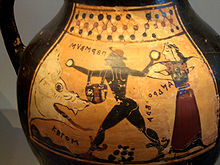
Back قيطس (أساطير) Arabic সেটাস (পুরাণ) Bengali/Bangla Κήτος (μυθολογία) Greek Ceto (monstruo marino) Spanish کتوس Persian Ketos (mytologia) Finnish Cète French Ketos ID Ceto (mitologia) Italian ケートス Japanese

In Ancient Greek ketos (κῆτος, plural kete/ketea, κήτη/κήτεα[1]), Latinized as cetus (pl. ceti or cete = cetea[2]), is any huge sea monster.[3] According to the mythology, Perseus slew a cetus to save Andromeda from being sacrificed to it. The term cetacean (for whale) derives from cetus. In Greek art, ceti were depicted as serpentine fish. The name of the mythological figure Ceto is derived from kētos. The name of the constellation Cetus also derives from this word.
- ^ Cite error: The named reference
sheldon-williamswas invoked but never defined (see the help page). - ^ Cite error: The named reference
hunterwas invoked but never defined (see the help page). - ^ "κῆτος" in Liddell, Henry and Robert Scott. 19406. A Greek-English Lexicon. Revised by H.S. Jones and R. McKenzie.. Oxford: Clarendon Press.
© MMXXIII Rich X Search. We shall prevail. All rights reserved. Rich X Search